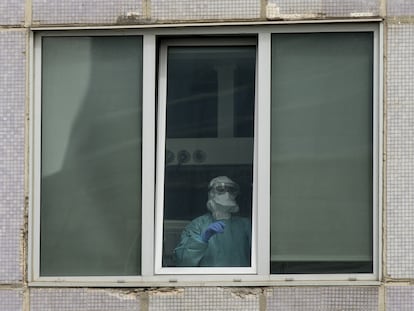640,000 rapid coronavirus tests arrive in Spain
The kits will first be sent out to health workers and then residences for seniors, before being rolled out to the rest of the population

Rapid testing kits that will detect the SARS-CoV-2 coronavirus have now arrived in Spain, after the Spanish government spent days promising that they were on their way. A total of 640,000 testing kits, which will be distributed “fairly” between Spanish regions, have been acquired from China and South Korea.
The tests will first be sent to health workers in Spain, who are risking contagion on a daily basis as they work to treat patients with the Covid-19 disease caused by the coronavirus. They will then be destined for seniors who are living in residences and care homes.

The tests will help the government to get a better picture of the effect of the ongoing pandemic in Spain, where the latest figures put the number of deaths at 1,813 and infections at nearly 30,000.
Some Spanish regions, such as Andalusia, Galicia and La Rioja, have not waited for the tests to arrive, and have begun to accelerate their diagnoses of patients with mild symptoms, who are being tested without having to get out of their cars. These patients are later analyzed with PCR tests, which have been used up to now by hospitals. The central government has ordered six million more of these to open out the tests to more areas of the population.
The World Health Organization (WHO) has insisted that countries carry out as much testing as possible, in order to stop the spread of the pandemic. But the lack of resources to do so in Spain has meant that the criteria for testing had to become more and more restrictive. In Madrid, 85% of people tested are coming back positive – that’s to say, only people who are very likely to be infected and are already showing serious symptoms, and in general are already hospitalized. For weeks now, mild cases have not been tested, meaning it is impossible to know the real rate of infection among the population.
The new antigenic tests will give back results in just a few minutes
According to Fernando Simón, the director of the Health Ministry’s Coordination Center for Health Alerts, there are more than 3,400 confirmed infections among Spanish health workers, 12% of the total. This is why tests will be sent first to these staff, who are a key group in the fight against the coronavirus. Then, Simón explained on Sunday, they will be rolled out to high-risk groups. “For example, in senior homes, to ensure that there are no new residents with infections and to be able to separate those who are sick in time. From then, the process, which will last two, three or four days, will continue until it reaches the entire population.”
Despite a claim on Saturday from the Spanish health authorities that 350,000 tests had been carried out in total, at a rate of 15,000 a day – the same rate that the countries testing the most – the lack of diagnoses in Spain is manifestly clear. Epidemiologists have no snapshot of the real infection rate in the country, and it is difficult to take drastic measures to isolate mild cases, given that people with symptoms are being advised to take measures as if they had tested positive, but do not have the certainty that they are infected.
The new fast tests will solve this problem, among others. Until now, the PCR tests being used took several hours of processing in a laboratory. The new antigenic tests will give back results in just a few minutes. They work, essentially, like a pregnancy test. The diagnosis can be positive, negative, or doubtful. Like pregnancy tests, colored bands appear depending on the quantity of antigens detected. If the result is unclear, the test can be repeated 24 hours later or a PCR test can be carried out for confirmation.
English version by Simon Hunter.
Tu suscripción se está usando en otro dispositivo
¿Quieres añadir otro usuario a tu suscripción?
Si continúas leyendo en este dispositivo, no se podrá leer en el otro.
FlechaTu suscripción se está usando en otro dispositivo y solo puedes acceder a EL PAÍS desde un dispositivo a la vez.
Si quieres compartir tu cuenta, cambia tu suscripción a la modalidad Premium, así podrás añadir otro usuario. Cada uno accederá con su propia cuenta de email, lo que os permitirá personalizar vuestra experiencia en EL PAÍS.
¿Tienes una suscripción de empresa? Accede aquí para contratar más cuentas.
En el caso de no saber quién está usando tu cuenta, te recomendamos cambiar tu contraseña aquí.
Si decides continuar compartiendo tu cuenta, este mensaje se mostrará en tu dispositivo y en el de la otra persona que está usando tu cuenta de forma indefinida, afectando a tu experiencia de lectura. Puedes consultar aquí los términos y condiciones de la suscripción digital.








































